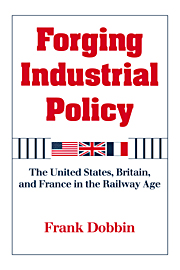2 - The United States
Published online by Cambridge University Press: 05 June 2012
Summary
Introduction
In 1887, Congress established the United States' first federal regulatory agency, the Interstate Commerce Commission (ICC), and charged it with protecting the economic liberties of railway customers and railwaymen by enforcing market competition and eliminating price-fixing and rate discrimination. The principle of enforcing market mechanisms to guard economic liberties was soon extended to the rest of the economy through the Sherman Antitrust Act. And in the twentieth century, Congress established regulatory agencies in the mold of the ICC to govern a wide variety of industries. Market regulation became the distinguishing feature of American industrial policy. The new American industrial policy paradigm came to symbolize competition among free and equal firms as the mainspring of progress. A natural selection theory of economic rationality arose in which markets rewarded efficient firms with prosperity and extinguished their inefficient competitors. The concentration of power in either the state or monopolistic firms came to be seen as the greatest threat to collective efficiency and progress, because concentration threatened market processes. Direct governmental participation in industry became anathema.
By the mid-twentieth century, market regulation was the United States' primary strategy for spurring growth, but that had not always been the case. At the dawn of the new nation, state and local governments actively promoted economic growth. They invested public funds in private enterprises and in general showed little reticence to take the reins of the economy. As Seymour Martin Lipset (1963) has argued, the first Americans did not draw a sharp line between state and civil society.
- Type
- Chapter
- Information
- Forging Industrial PolicyThe United States, Britain, and France in the Railway Age, pp. 28 - 94Publisher: Cambridge University PressPrint publication year: 1994
- 1
- Cited by



